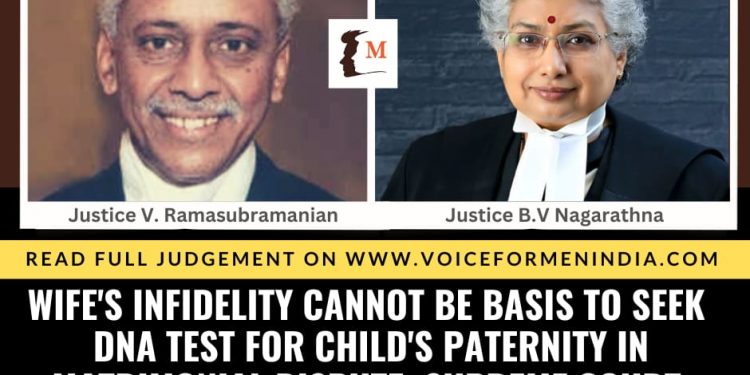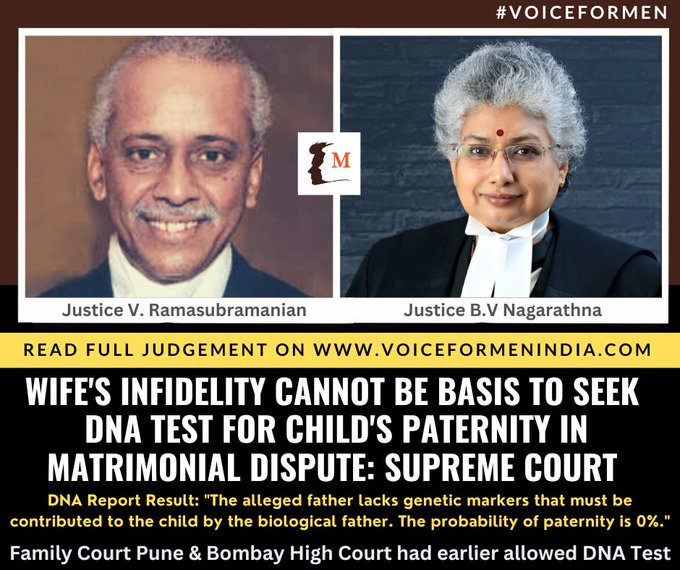The Supreme Court in its 72-page judgement dated February 20, 2023 held that DNA test in children to ascertain their paternity in matrimonial disputes, should be done only in exceptional cases when it becomes indispensable to resolve the dispute.
Facts of the Case:
Parties got married as per Hindu rites and rituals at Pune, on 23rd November, 2005. Their first child, Master HF, was born on 21st December, 2009. During the subsistence of their marriage, a second son, Master AF, was born on 17th July, 2013.
On 1st June, 2017, the respondent-husband, filed a petition for divorce under Sections 13(1)(i) and (ia) of the Hindu Marriage Act, 1955 seeking custody of their two children before the Family Court, Pune.
Allegations by Husband
In the petition for divorce, the respondent-husband alleged that the appellant-wife was in an adulterous relationship with one KB, and the respondent discovered the same on 14th September, 2016 when he found that certain intimate messages had been exchanged between the appellant and KB.
On 9th November, 2020, the respondent filed an application before the Family Court, Pune seeking a direction to subject Master AF, the second child born to the appellant-wife, during the subsistence of her marriage with the respondent to DNA testing, with a view to ascertain the child’s paternity. The husband alleged that Master AF, the second son born to the appellant-wife, during the subsistence of her marriage with the respondent, was born out of an adulterous relationship between the appellant and KB.
The husband also submitted that on being confronted about the same, the appellant-wife admitted to the adulterous relationship with KB.
Since the respondent was unwilling to accept the truth as confirmed by the appellant, he decided to further investigate the issue of Master AF’s paternity and hence, caused a DNA test to be conducted at DNA Labs India, a private laboratory. The DNA Test report dated 24th November, 2016 indicated as follows:
The alleged father lacks genetic markers that must be contributed to the child by the biological father. The probability of paternity is 0%.
Defense by Wife:
The appellant-wife filed an affidavit in her reply, opposing the application filed by the respondent seeking a direction to conduct DNA test of Master AF, inter-alia, contending that the respondent had not made out a prima-facie case requiring the Court to exercise its discretion to direct DNA test to be conducted as prayed for.
Family Court, Pune
By an order dated 12th August, 2021, the Family Court, Pune, allowed the application filed by the respondent seeking DNA test of Master AF and further observed that in the event that the appellant fails to comply with the directions of the Court, the allegations of adultery as against her would be determined by drawing an adverse inference as contemplated under Illustration (h) of Section 114 of the Indian Evidence Act, 1872 (hereinafter “Evidence Act” for the sake of brevity). The salient findings of the Family Court may be encapsulated as under:
Reliance was placed on the decision of this Court in Nandlal Wasudeo Badwaik vs. Lata Nandlal Badwaik, (2014) 2 SCC 576, to hold that Section 112 of the Evidence Act was enacted at a time when scientific advancement in the field of DNA test was not as sophisticated.
High Court of Judicature at Bombay
Aggrieved by the Order dated 12th August, 2021 passed by the Family Court, Pune, the appellant filed a Writ Petition before the High Court of Judicature at Bombay, assailing the same, inter-alia, on the ground that the Family Court failed to appreciate that a strong prima-facie case is a sine qua non for directing DNA profiling and that there was no evidence to support the respondent’s prayer for DNA test. Further, that the order of the Family Court was contrary to the presumption provided under Section 112 of the Indian Evidence Act and the provisions of the Hindu Marriage Act, 1955 and was contrary to the fundamental rights guaranteed under Article 21 of the Constitution of India.
By the impugned judgment dated 22nd November, 2021 the High Court dismissed the Writ Petition filed by the appellant herein and upheld the order of the Family Court dated 12th August, 2021.
Arguments by Wife
The counsel representing the petitioner-wife pointed out that the courts below routinely directed DNA tests without considering the presumption of legitimacy under Section 112 of the Indian Evidence Act, the legal principles established in the case of Goutam Kundu v. State of West Bengal & Anr, and the fundamental rights of the child, including their best interests, right to privacy, identity and autonomy.
Submission by Husband
On the other hand, counsel for the respondent-husband contended that the orders under challenge were based on an unimpeachable appreciation of the facts of the case and did not warrant any interference. He further contended that the appeal was filed by the petitioner to mask her adulterous conduct.
Furthermore, he contended that in the present case, the most material piece of evidence to establish the allegations of adultery was the DNA test, and that the same cannot be shut out on the ground of sensitivity or privacy.
Supreme Court of India
A division bench of Justice BV Nagarathna and Justice V Ramasubramanian observed that the right of children to not have their legitimacy questioned frivolously is an essential attribute of their right to privacy. At the outset, the Court said:
Children have the right not to have their legitimacy questioned frivolously before a Court of Law.
This is an essential attribute of the right to privacy. Courts are therefore required to acknowledge that children are not to be regarded like material objects, and be subjected to forensic/DNA testing, particularly when they are not parties to the divorce proceeding. It is imperative that children do not become the focal point of the battle between spouses.
Hence, the Court laid down the factors to be considered while deciding the question of whether a DNA Test of a minor child should be ordered at the behest of either parent.
Supreme Court Guidelines On DNA Test
The Supreme Court laid down the following principles of law dealing with the presumption of legitimacy of a child born during wedlock under section 112 of Evidence Act and the circumstances under which this presumption can be rebutted through evidence:
(a) The object behind the presumption of legitimacy laid down under Section 112 qua a child born during the wedlock read with Section 4 of the Indian Evidence Act, 1872, is to prevent an unwarranted enquiry as to the paternity of the child whose parents at the relevant time had “access” to each other.
(b) For rebutting the presumption of legitimacy under Section 112 of Indian Evidence Act, 1872, the party questioning the legitimacy of the minor child is required to prima facie show “non-access” to other party. Further, if no plea has been raised as to “non-access”, the DNA Test may not be directed.
(c) That a direction to conduct a DNA Test of a minor child should be viewed from the prism of the child, keeping in mind the best interest of the child.
(d) Such a direction should be ordered by the Court rarely, and only in exceptional and deserving cases, where such a test becomes indispensable to resolve the controversy.
(e) An adverse inference under Section 114(h) of Evidence Act cannot be drawn against the petitioner-wife who in her capacity as mother and natural guardian is refusing the DNA Test of the minor child and is protecting the interest of the child.
The Court further noted:
The short question in the present appeal is as to how a Court can prevent the law’s tidy assumptions linking paternity with matrimony, from collapsing, particularly when parties are routinely attempting to dislodge such presumptions by employing modern genetic profiling techniques.
The Court began its judgment by saying,
Under the Indian legal spectrum, a husband is strongly presumed to be the father of a child born to his wife. Thus, there is a strong presumption regarding the paternity of a child.
This presumption can be overcome only by evidence precluding any procreative role of the husband, such as by showing that the husband and wife had no access to each other at the relevant time of possible conception. In the absence of proof of non-access, the law considers the husband’s paternity to be conclusively established if they cohabited when the child was likely to have been conceived.
It ruled that the dispute was between the parties to the marriage and that the rights and best interests of the child could not be sacrificed to enable one of the parties to have the benefit of a fair trial. The Court added,
The lis in these cases is between the parties to a marriage. The lis is not between one of the parties to the marriage and the child whose paternity is questioned. To enable one of the parties to the marriage to have the benefit of fair trial, the Court cannot sacrifice the rights and best interests of a third party to the lis, namely, the child.
Specifically with regard to the case, the Court noted that the husband himself had categorically claimed that he was in possession of call recordings/transcripts and the daily diary of the appellant-wife, which may be summoned in accordance with law to prove the infidelity of the appellant. The Court further said:
Therefore, it seems to us that the respondent is in a position to attempt to make out a case based on such evidence, as to adultery/infidelity on the part of the appellant.
Hence, it ruled that a DNA test would not be the only way in which the truth of the matter can be established.
The Court, therefore, allowed the appeal by the wife and set aside the order of the family court and Bombay High Court which had allowed DNA test. Concluding the matter, the Court said,
However, this shall not preclude the respondent-husband from leading any other evidence to establish the allegations made by him against the appellant in the petition for divorce.
The Court also clarified that Section 112 does not provide protection for the alleged adulterous behavior of the wife. It said,
We are not suggesting for a moment that Section 112 acts as a shield even for the alleged adulterous conduct on the part of the wife. All that we say is that anything that would destroy the legal effect of Section 112 cannot be used by the respondent, on the ground that the same is being done to achieve another result.
LEAVE YOUR COMMENTS ON THIS CASE BELOW:
READ JUDGEMENT | Wife's Infidelity Cannot Be Basis To Seek DNA Test In Matrimonial Dispute: Supreme Court
— Voice For Men India (@voiceformenind) February 22, 2023
▪️DNA Result 2016: "Alleged father lacks genetic markers that must be contributed to child by biological father. Probability of paternity is 0%"https://t.co/a70GTPPsj2
MUST WATCH:
ARE DNA PATERNITY TESTS LEGAL IN INDIA?
Join our Facebook Group or follow us on social media by clicking on the icons below
If you find value in our work, you may choose to donate to Voice For Men Foundation via Milaap OR via UPI: voiceformenindia@hdfcbank (80G tax exemption applicable)
































